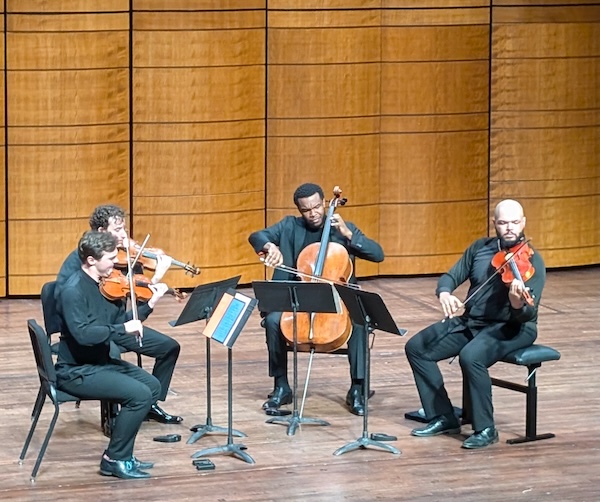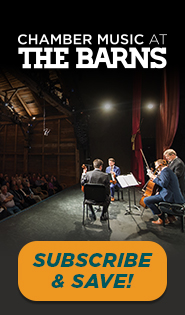Childs’ work provides the highlight as Isidore Quartet opens new Fortas season

The Isidore String Quartet performed Wednesday night at the Kennedy Center in the Fortas Chamber Music Series. Photo: WCR
The Isidore String Quartet returned to the Kennedy Center Wednesday night, to open the first full season of programming for Jennifer Koh as artistic director of the Fortas Chamber Music Concerts series. Introducing the concert in the Terrace Theater, Koh explained that the season’s guest string quartets would focus on the theme of Beethoven’s late quartets, paired with contemporary music.
This young quartet, founded in 2019 by students at Juilliard, quickly rose to prominence following their win at the Banff International String Quartet Competition in 2022. Riding a wave of acclaim, the group presented their fourth local appearance in just the last year and a half. Not surprisingly for a group still in their 20s, some dubious interpretive decisions were in evidence, alongside some exquisitely unified playing.
With violinist Phoenix Avalon sitting in the first chair, the group turned in an extraordinary reading of the slow movement of Mozart’s String Quartet No. 19. Taking an expansive approach to the Andante cantabile marking, the group maximized this music’s expressive potential. All four instruments sounded with whispering intensity in quiet moments, the intonation and blend near faultless, revealing some gorgeous motivic interplay and harmonic sweetness.
All four musicians played with a minimum of vibrato, making the infamous discordant opening to the first movement, which gave the work its later nickname (“Dissonance”), a soft but searing energy over the throbbing repeated notes from cellist Joshua McClendon. The initial pacing of the Allegro section proved hectic, as Avalon tended to rush ahead at times, but the many running passages for the first violin improved as the tempo inevitably settled down.
A similar instability undermined the jokey humor of the voluble third movement, although the quick tempo suited the Trio section better. Speed is indeed called for in the Finale, which pulsed with excitement, although again the extensive, blurred runs for the first violin went by too fast to appreciate much.
Paired with the late Beethoven at the end of the concert was the String Quartet No. 3 of Billy Childs (“Unrequited”), a single movement lasting about 11 minutes. The American jazz pianist, who also completed a degree in composition, has penned three string quartets. The last two are both worthy additions to the repertoire, stronger than his orchestral work. With this most recent example, from 2015, the Isidores followed up on their fine work with String Quartet No. 2 (“Awakening”) at Banff and the Kennedy Center last year.
Childs composed the piece as a companion to Janáček’s String Quartet No. 2 (“Intimate Letters”), a rumination on the Czech composer’s passionate but unrequited love for Kamila Stösslová, a woman forty years his junior. This piece, now with Adrian Steele playing first violin with more vibrato, opened with an ardent love theme. The musically sensitive violist Devin Moore then picked up this romantic lead melody, accompanied by fearful tremolos in the other instruments.
Avalon and Moore traded obsessive running figures, as the music passed through the states of Janáček’s intense obsession. Ultimately, Steele soared into the highest range, with fragile harmonics, a last surge of hope that reluctantly came back down to earth. The other instruments accompanied this with repetitive patterns, and the piece concluded on a tense chord, rife with unresolved dissonance. If they have not already planned to do so, this quartet should make a recording of all of Childs’ string quartets.
The Childs piece proved the high point of the program, with some of the same issues of rushed instability noted in the Mozart work also undercutting Beethoven’s String Quartet No. 12. The first movement began in a promising way, as the group did not overdo the Maestoso introduction. Steele’s calmer presence on first violin kept the flowing Allegro main theme more serene, leading to a charming understated conclusion.
The musicians triumphed in the massive second movement with remarkable patience, weaving a slow, song-like spell that was dreamy but not overly drawn out. No one overplayed his hand, so that this impeccable interpretation seemed the result of careful cooperation and listening among the quartet’s members. In the late quartets, Beethoven made harsh demands in terms of range, and Steele’s work on the highest string never had to be forced because of how his colleagues supported him.
The Scherzo opened playfully, with violist and cellist united on their hushed, enigmatic lines together. The Trio, a crazy Presto, threatened to pull apart at the seams due to the group’s tendency to rush ahead in fast tempos. Although the Finale had a jaunty, tautly controlled feel to it, mannered articulation of the main theme limited the music’s effect. Tepid applause and a shocking number of early exits among the audience after the Beethoven, which the performers likely noticed, staved off any hope of an encore.
Jennifer Koh and the Fortas series host the Sounds of Us new music festival, with performances all day long November 16, including 48 world premieres. kennedy-center.org

